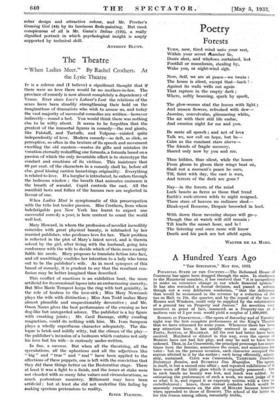The Theatre
" When Ladies Meet." By Rachel Crothers. At the Lyric Theatre
IT is a solemn and (I believe) a significant thought that if there were no love there would be no mothers-in-law. The province of comedy is now almost completely a dependency of Venus. Ever since Love's Labour's Lost the relations of the sexes have been steadily strengthening their hold on the imaginations of dramatists who wish to amuse us, and today the vast majority of successful comedies are written—however indirectly—round a bed. You would think there was nothing else to be witty about. It seems to be forgotten that the greatest of the immortal figures in comedy—the real giants, like Falstaff, and Tartuffe, and Volpone—existed quite independently of love. Modern comedy—so deft, so slick, so perceptive, so often in the texture of its speech and movement excelling the old masters—wastes its gifts and mistakes its vocation eternally reshuffling one formula, a formula based on a passion of which the only invariable effect is to stereotype the conduct and emotions of its victims. This insistence that 80 per cent. of the characters in a comedy shall be, before all else, good kissing carrion hamstrings originality. Everything is related to love. If a burglar is introduced, he enters through the bedroom window ; the breath that animates eminence is the breath of scandal. Cupid controls the cast. All the manifold lusts and follies of the human race are 'neglected in favour of one.
When Ladies Meet is symptomatic of this preoccupation with the trite but tender passion. Miss Crothers, from whose indefatigable pen New York has learnt to expect one successful comedy a year, is here content to count the world well lost.
Mary Howard, in whom the profession of novelist incredibly coincides with great physical beauty, is infatuated by her married publisher, who professes love for her. Their problem is reflected in the plot of Mary's latest novel, and is therein solved by the girl, after living with the husband, going into conference with the wife to decide which of them more exactly fulfils his needs. Mary proposes to translate fiction into fact, and all unwittingly confides her intention to a lady who turns out to be the publisher's wife. As in most synopses of this brand of comedy, it is prudent to say that the resultant con- fusion may be better imagined than described.
This conflict of emotions is an exhibition bout, the more artificial for its occasional lapses into an embarrassing sincerity. But Miss Marie Tempest keeps the ring with tart geniality, in the role of hostess to the love-sick ; Miss Mary Newcomb plays the wife with distinction ; Miss Ann Todd makes Mary almost plausible and unquestionably decorative ; and Mr. Owen Nares gives the best performance of the evening as her dog-like but unregarded adorer. The publisher is a lay figure with creaking joints ; Mr. Cecil Ramage, stiffly exuding magnetism, could do nothing with him. Mr. Ivan Sampson plays a wholly superfluous character adequately. The dia- logue is brisk and mildly witty, but the climax of the play— the publisher's invasion of a bedroom which contains not only his love but his wife—is curiously under-written.
In fine, a success. But when all the theorizing, all the speculations, all the aphorisms and all the adjectives like " big " and "'true " and " real " have been applied to the affections of these puppets, one is left with the conviction that they did these things 'better on the Restoration stage. There at least it was a fight to a finish, and the issues at stake were not clouded with so many false values and-circumlocutions, so much portentous casuistry. Millamant may have been artificial ; but at least she did not underline this failing by making specious pretensions to reality.
form FLEMIN(4.










































 Previous page
Previous page